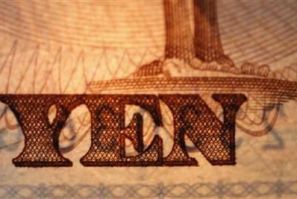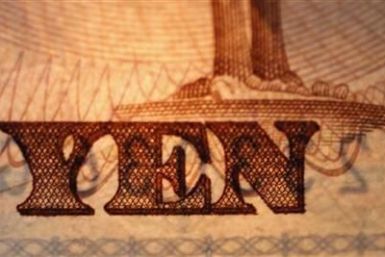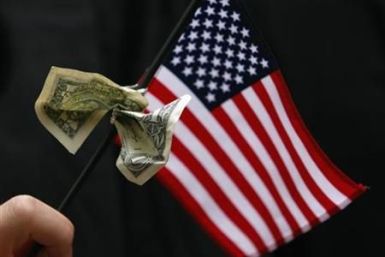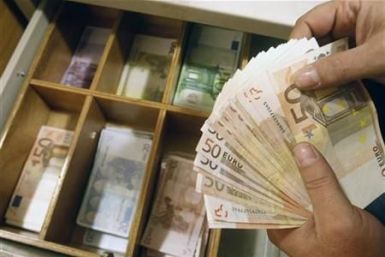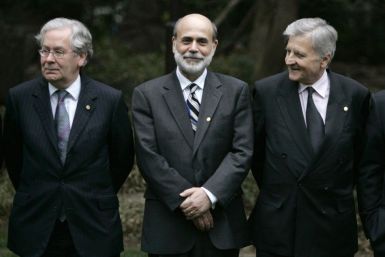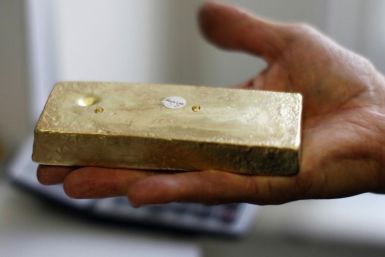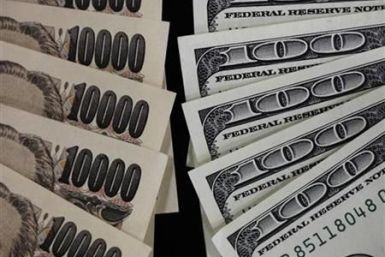The Japanese intervention took the forex market by storm late Sunday, sending the Japanese yen over 5 percent lower against the U.S. dollar in a little over one hour.
Gold prices fell 1.4 percent Monday as the bankruptcy of a broker-dealer heavily invested in European sovereign debt drove investors to the safety of the dollar.
The yen dropped to a three-month low against the dollar on Monday after Japan intervened in the market to curb the currency's rise even as traders said more official action is needed for a sustained impact.
The Nikkei average edged lower, giving up sharp morning gains made after Japanese authorities intervened to curb persistent yen strength as investors locked in profits on concerns the yen won't stay down for long.
The Bank of Japan eased monetary policy on Thursday by boosting purchases of government bonds and warned of risks posed by a strong yen and Europe's debt crisis in a sign it would act again if recovery in the world's third-largest economy falters.
World stocks and the euro rose to their highest levels in nearly two months on Thursday after European leaders struck a deal to resolve a two-year-old sovereign debt crisis, which threatens the survival of the single currency.
The Bank of Japan will likely debate easing monetary policy further on Thursday given the yen's renewed spike to record highs and growing doubts that European leaders will calm markets with a clear plan to rein in the region's debt crisis.
Bank of Japan Governor Masaaki Shirakawa said on Thursday that solid growth in emerging markets will continue to underpin Japan's economy, suggesting the central bank will stick to its forecast of a moderate recovery when its board meets next week.
Equities were expected to steady on Friday after sharp gains in the previous session, with futures for the S&P 500 staying flat, for the Dow Jones gaining 0.08 percent and for the Nasdaq 100 falling 0.07 percent.
As the U.S. economy slouches toward another recession and confidence in policymakers erodes, investors are coming to grips with the notion that the country may already be several years into a Japan-style lost decade.
Gold prices rebounded Friday, along with other safe-haven investments, literally hours after dropping sharply on word that the world's biggest central bankers were jointly moving to protect the eurozone's commercial financial institutions.
Gold and silver prices moved higher late Thursday after posting big losses in the New York futures market.
Gold and silver fell hard Thursday after five major central banks announced a coordinated plan to inject U.S. dollars into European banks straining under the load of the continent's sovereign debt crisis.
The world's major central banks, led by the European Central Bank and the U.S. Federal Reserve, in a coordinated effort Thursday intervened to provide dollar loans to commercial banks in an effort to maintain liquidity in Europe and check institutional investor concern about Europe's private sector banks. What will be the impact on U.S. stocks?
The new loan offers will be conducted in October, November and December.
Japanese manufacturing confidence improved for a fifth straight month in September but the pace of recovery slowed to a crawl, with a strong yen and faltering global growth starting to take a toll on the world's No.3 economy, a Reuters poll showed.
Gold prices steadied in volatile trade on Tuesday after briefly extending the previous session's 2.5 percent slide below $1,800 an ounce, as the dollar's gains versus the euro put fresh pressure on the precious metal.
The Bank of Japan kept its policy settings unchanged on Wednesday, saving up its scant ammunition for later, while the yen stabilized in the wake of Switzerland's radical action to curb its soaring currency.
Investors are agonizing over the prospect of another round of quantitative easing that could come from the Fed chairman Ben Bernanke’s Jackson Hole summit later this week.
Moves by the Swiss National Bank to curb strength of the Swiss franc will fuel investors' insatiable demand for gold, adding to its relentless rise to new record highs as confidence in the franc as a safe store of value dwindles.
Japan will take decisive action against any speculative moves in the currency market, Finance Minister Yoshihiko Noda said, signaling Tokyo's readiness to intervene to stem further yen rises after its spike to a record high last week.
The Bank of Japan will consider easing monetary policy further, possibly at an emergency meeting before next month's rate review, if further rises in the yen push down Tokyo stock prices enough to hit business sentiment, sources said.








